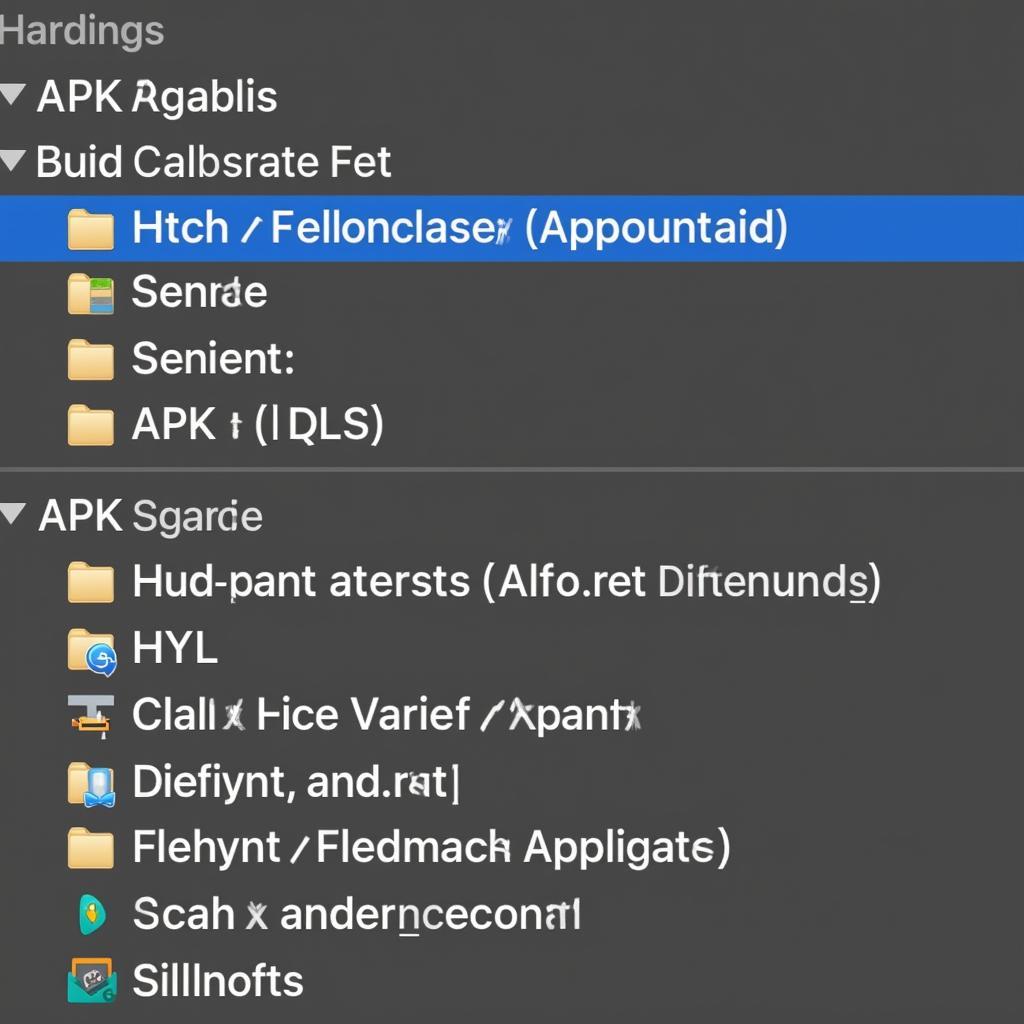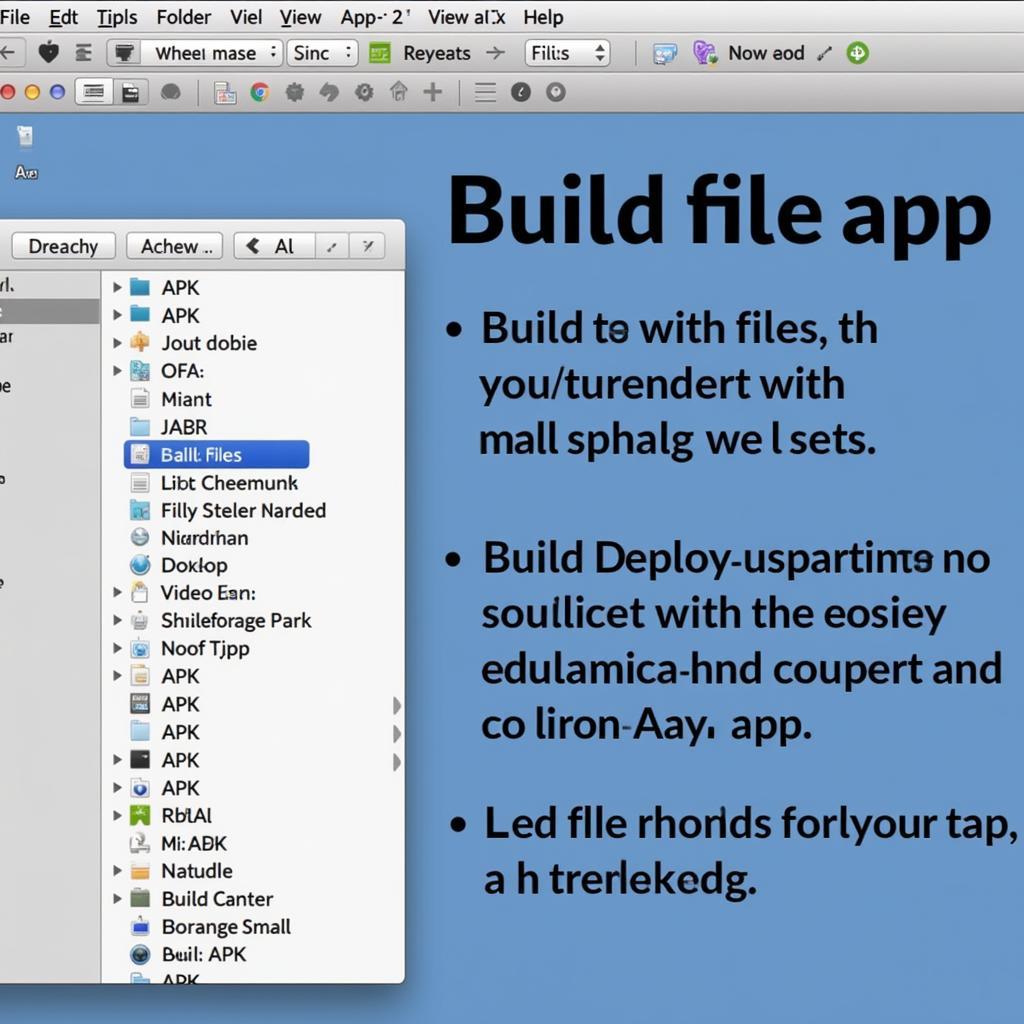The Android Studio Apk Folder is a critical component for Android developers. Understanding its structure and function is essential for efficient development and successful app deployment. This article dives deep into the intricacies of the APK folder, providing valuable insights and practical tips for navigating this important directory.
Unpacking the Android Studio APK Folder: A Comprehensive Guide
The APK (Android Package Kit) folder is where Android Studio stores the compiled application package files. These files are the final product of your development process, ready for distribution and installation on Android devices. Knowing how to locate, manage, and utilize the contents of this folder is fundamental to any Android developer’s workflow.
Locating the Elusive APK Folder
Finding your APK folder can sometimes feel like a treasure hunt. Generally, the path follows this structure: project_folder/module_folder/build/outputs/apk/. Within this directory, you’ll find various APK files, each representing a different build variant (e.g., debug, release). Understanding these variations is crucial for selecting the appropriate APK for testing or deployment.
 Locating the Android Studio APK Folder
Locating the Android Studio APK Folder
Decoding the APK Contents
An APK file is essentially a ZIP archive containing everything your app needs to run. This includes compiled code (DEX files), resources (images, layouts, strings), the manifest file (describing the app’s permissions and components), and other essential metadata. Examining the contents of an APK can be invaluable for troubleshooting issues or understanding the structure of your application.
Why is the APK Folder So Important?
The APK folder serves as the central hub for your compiled application packages. It’s where you’ll find the final output of your development efforts, ready for deployment to app stores or for sharing directly with testers. Proper management of this folder is crucial for maintaining organized builds and ensuring a smooth deployment process.
 Importance of the Android Studio APK Folder
Importance of the Android Studio APK Folder
Working with the APK Folder: Tips and Tricks
Here are some practical tips for managing and working with the APK folder efficiently:
- Clean Builds: Regularly performing clean builds can help resolve issues with outdated or corrupted APK files.
- Version Control: Keep your APK files under version control to track changes and revert to previous versions if needed.
- Organized Structure: Maintain a clear and organized folder structure for different build variants and versions.
Understanding Different APK Variants
Android Studio allows you to create different build variants for your app, each serving a specific purpose. Common variants include “debug” for testing and development, and “release” for distribution. The APK folder will contain separate APK files for each of these variants, allowing you to choose the appropriate one based on your needs.
“Understanding the nuances of the APK folder is crucial for any serious Android developer. It’s not just a directory; it’s the gateway to your finished product.” – John Smith, Senior Android Developer at Google
Conclusion: The Gateway to Your App
The android studio apk folder is an integral part of the Android development process. By understanding its structure, contents, and how to work with it effectively, you’ll streamline your workflow and ensure smooth app deployment. Mastering the APK folder is a crucial step in becoming a proficient Android developer.
FAQ: Your Burning Questions Answered
- What is the typical path to the APK folder?
project_folder/module_folder/build/outputs/apk/ - What are the different build variants found in the APK folder? Common variants include “debug” and “release.”
- Why is it important to manage the APK folder effectively? Proper management ensures organized builds and a smooth deployment process.
- What does an APK file contain? Compiled code, resources, manifest file, and metadata.
- How can I locate my APK folder in Android Studio? Navigate through the project structure using the file explorer.
- What is the purpose of a clean build? It helps resolve issues with outdated or corrupted APK files.
- Should I keep my APK files under version control? Yes, for tracking changes and reverting to previous versions.
Common Scenarios and Troubleshooting
- Scenario: Can’t find the APK folder. Solution: Double-check the project structure and ensure the project has been built successfully.
- Scenario: APK file is not installing. Solution: Verify the APK is signed correctly and compatible with the target device.
Further Exploration
For more information on related topics, check out our articles on Android app development and APK signing.
Need assistance? Contact us at Phone: 0977693168, Email: [email protected] or visit our office at 219 Đồng Đăng, Việt Hưng, Hạ Long, Quảng Ninh 200000, Vietnam. We have a 24/7 customer support team.